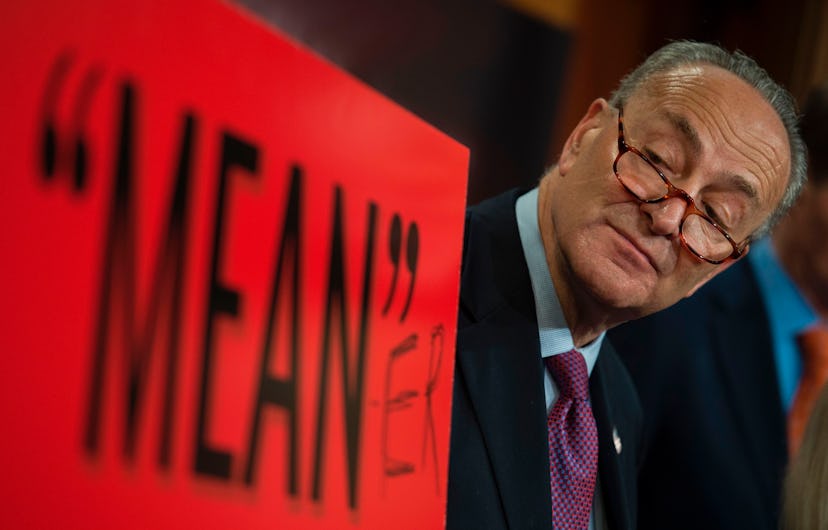Why the New Senate Health Care Bill Is Just As Grim As Its “Mean” Predecessor
Despite a facelift, the newest draft rolling back the Affordable Care Act doesn’t do much to improve on the original—and that might be worse.

Drafted in secret by a cadre of Republican lawmakers led by Majority Leader Mitch McConnell, the full text of the GOP’s healthcare bill that would begin rolling back the Affordable Care Act and Medicaid coverage was unveiled Thursday morning, after drafts had started circulating Wednesday. The bill, a successor to the much-reviled House of Representatives’ healthcare bill that passed by a narrow margin—with 217 Republicans voting in its favor, and 213 Democrats and Republicans alike voting against—was initially expected to radically overhaul its predecessor.
Instead, as the New York Times reported Thursday morning, it maintains the structure and many of the provisions of the first, with a few concessions, ostensibly intended to swing the votes of those Republicans who had allied with the Democrats in opposing the bill.
As proposed Thursday, the new Senate bill maintains many of the provisions of the House bill passed last month—removing many of the taxes that allow the Affordable Care Act to pay for itself, limiting the expansion of Medicaid while extending the timeline for halting expansion, and declining to mandate individual and employer coverage—while tempering some of the original bill’s more controversial measures. Patients with preexisting conditions, who would face rising premiums under the House bill, are afforded some protection under the Senate bill, and it also maintains some Obamacare provisions that make insurance affordable to lower-income customers.
It still defunds Planned Parenthood, and it prevents pregnant women from being eligible for Medicaid expansion.
Lawmakers, activists, and Hollywood personalities began speaking out en masse over social media—Sarah Sophie Flicker called it “inhuman and shameful,” Senator Kamala Harris described it as “worse than we thought” and Zoe Kazan took to Twitter to urge her followers to call their elected officials.
The general takeaway is that the Senate’s bill is intended as a “gentler” approach to the drastic measures put forth in the House bill—even President Trump, in his limited vocabulary, called the House bill “mean,” expressing hope the Senate bill might have a bit more “heart”; on the other end of the spectrum, Kentucky’s Rand Paul has indicated the Senate version doesn’t go far enough, describing it as “Obamacare-lite.”
But the Senate draft is, in its way, just as “mean,” and perhaps more insidious, the good cop to the House’s bad, morally bankrupt cop. It capitalizes on the criticism of the first, maintaining many of the provisions while offering a few concessions that allow it to be seen as a more palatable alternative in order to scrape by to a majority vote.
In a recent story on FiveThirtyEight, Perry Bacon, Jr., wrote, “In the House, a lot of members basically said, ‘We had a vote over here, but the Senate will fix whatever we did wrong.’” (“Is this bill good? No, I don’t like it,” one representative told New York magazine.)
The Senate heard the criticisms of the first bill—including the outcry over stripped coverage for patients with preexisting conditions and the Congressional Budget Office’s estimate that it would result in 14 million fewer insured Americans by next year, and as many as 23 million fewer by 2026—and failed to course-correct.
Alarmingly, the New York Times blog the Upshot reported earlier this month that the American Health Care Act does not have a plurality of support in any state. Its support caps out in Oklahoma, with 38 percent in favor, 45 percent opposed, and 17 percent with no opinion. This makes it less popular than Obamacare, according to the Upshot—and less popular even than the infamous bailout following the 2008 recession.
The bill in its various forms doesn’t reflect the will of even Republican constituents, yet with each successive draft, the bill earns more supporters without substantive change; it continues to put those whose health is most vulnerable—the poor, the disabled, the elderly—at the most risk while benefiting the wealthiest Americans. Its concessions are superficial at best. Even the bill’s title, the “Better Care Reconciliation Act of 2017,” seems designed to neutralize criticism, a peace offering built into its very title.
What’s more, Thursday’s draft is just that—a draft. Those Republicans who have spoken out against some of the more radical measures will have the opportunity to input their own suggestions. They will vocally oppose, and then modify, the terms of the bill, toting the concessions they win home to their constituents as a limp prize.
Or not—since the new bill, not at all suspiciously, proposes implementing a new “age tax” in 2019 rather than 2018, when midterm elections will be but a memory.
Watch: “Women’s Rights Are Human Rights”: 62 Fashion Insiders Speak Out in a Powerful Video for International Women’s Day